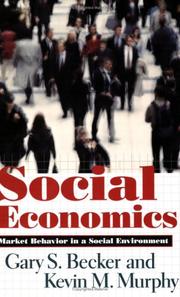| Listing 1 - 8 of 8 |
Sort by
|
Book
ISBN: 2728806659 9782728806652 Year: 2020 Publisher: Paris : Rue d'Ulm,
Abstract | Keywords | Export | Availability | Bookmark
 Loading...
Loading...Choose an application
- Reference Manager
- EndNote
- RefWorks (Direct export to RefWorks)
La vie quotidienne est au centre d’interactions personnelles et professionnelles qui constituent l’un des moteurs du comportement et du succès de chacun. M. Comola nous propose de parcourir des situations diverses – recherche d’emploi, transmission d’informations, usage des plateformes numériques, recours aux technologies, mécanismes d'assurance, commerce, ou encore discrimination sociale – dans lesquelles ce sont les liens sociaux qui font toute la différence entre la réussite et l’échec. On constate alors que ces liens, loin de se limiter à la sphère privée, acquièrent une dimension économique qu’il convient de mettre au cœur du débat public.

ISBN: 2913165117 9782913165113 Year: 2000 Publisher: Paris : Editions Syllepse,
Abstract | Keywords | Export | Availability | Bookmark
 Loading...
Loading...Choose an application
- Reference Manager
- EndNote
- RefWorks (Direct export to RefWorks)
Economic man --- Liberalism --- Economics --- Homo oeconomicus --- Libéralisme --- Economie politique --- Social interaction --- Decision making --- Economic aspects --- Economic man. --- Decision making. --- Economic aspects. --- Libéralisme --- Economics - Decision making --- Social interaction - Economic aspects
Book
ISBN: 9780444537133 0444537139 0444531874 9780444531872 0444537074 9780444537072 9786613920737 0444537147 1283608286 Year: 2011 Publisher: Amsterdam North-Holland
Abstract | Keywords | Export | Availability | Bookmark
 Loading...
Loading...Choose an application
- Reference Manager
- EndNote
- RefWorks (Direct export to RefWorks)
Social policy --- Economic sociology --- Social psychology --- Economics --- Economie politique --- Sociological aspects. --- Aspect sociologique --- Social interaction --- Sociological aspects --- Economic aspects --- AA / International- internationaal --- 201 --- 316.334.2 --- Sociologie: algemeenheden. --- Economische sociologie. Industriele sociologie --- 316.334.2 Economische sociologie. Industriele sociologie --- Sociologie: algemeenheden --- Economics - Sociological aspects --- Social interaction - Economic aspects

ISBN: 0521848849 0521169550 1139810324 110715314X 1107316529 1107321913 110731836X 0511522150 1107317487 1107315549 1299399606 9780521848848 9781107321915 9780511522154 9781107316522 9780521169554 Year: 2005 Publisher: Cambridge ; New York : Cambridge University Press,
Abstract | Keywords | Export | Availability | Bookmark
 Loading...
Loading...Choose an application
- Reference Manager
- EndNote
- RefWorks (Direct export to RefWorks)
First published in 2005, Economics and Social Interaction is a fresh attempt to overcome the traditional inability of economics to deal with interpersonal phenomena that occur within the sphere of markets and productive organizations. It makes use of traditional economic concepts for understanding interpersonal events, while venturing beyond those concepts to give a better account of personalised interactions. In contrast to other books, Economics and Social Interaction offers the reader a rigorous effort at extending economic analysis to a difficult field in a consistent manner, sensitive to insights from other behavioural and social sciences. This collection represents an important contribution to a growing research agenda in the social sciences.
Economics --- Social psychology --- Social interaction --- Sociological aspects. --- Economic aspects. --- Business, Economy and Management --- Human interaction --- Interaction, Social --- Symbolic interaction --- Exchange theory (Sociology) --- Psychology --- Economic sociology --- Socio-economics --- Socioeconomics --- Sociology of economics --- Sociology --- Social aspects --- Economics - Sociological aspects. --- Social interaction - Economic aspects. --- Sociologie économique --- Social interaction. --- Economic aspects --- Interaction sociale --- Aspect économique.

ISBN: 0262041863 9780262041867 Year: 2001 Publisher: Washington (D.C.): Brookings institution
Abstract | Keywords | Export | Availability | Bookmark
 Loading...
Loading...Choose an application
- Reference Manager
- EndNote
- RefWorks (Direct export to RefWorks)
Economic sociology --- Social interaction. --- Social interaction --- Economics --- Interaction sociale --- Economie politique --- Economic aspects. --- Sociological aspects. --- Aspect économique --- Aspect sociologique --- Economic aspects --- Sociological aspects --- 316.344.2 --- -Social interaction --- -Human interaction --- Interaction, Social --- Symbolic interaction --- Exchange theory (Sociology) --- Psychology --- Social psychology --- Economic theory --- Political economy --- Social sciences --- Economic man --- Socio-economische groepen --- -Socio-economische groepen --- 316.344.2 Socio-economische groepen --- Aspect économique --- Human interaction --- Socio-economics --- Socioeconomics --- Sociology of economics --- Sociology --- Social aspects --- Social interaction - Economic aspects --- Economics - Sociological aspects
Book
ISBN: 3531177842 3531931733 Year: 2011 Publisher: Wiesbaden : VS Verlag für Sozialwissenschaften : Imprint: VS Verlag für Sozialwissenschaften,
Abstract | Keywords | Export | Availability | Bookmark
 Loading...
Loading...Choose an application
- Reference Manager
- EndNote
- RefWorks (Direct export to RefWorks)
How do young adults decide to become parents or to remain childless? Is this an individual choice, a couple’s decision or are there other social influences involved, such as social networks? Using a mixed-methods design, Sylvia Keim combines problem-centred interviews and network data collected among young adults in western Germany. The author shows that personal relations strongly influence the perceptions, attitudes, and plans individuals express concerning parenthood. She identifies basic mechanisms and channels of social influence as well as relevant network structures. This book is valuable reading for academics, students, and policy makers interested in family research, the network perspective, and mixed-methods research.
Attribution (Social psychology). --- Interpersonal relations. --- Social interaction -- Economic aspects. --- Social norms. --- Sociology & Social History --- Social Sciences --- Social Change --- Parenthood --- Decision making --- Fertility, Human --- Young adults --- Interpersonal relations in young adults --- Social networks --- Young people --- Young persons --- Human fertility --- Natality --- Deciding --- Decision (Psychology) --- Decision analysis --- Decision processes --- Making decisions --- Management --- Management decisions --- Social sciences. --- Sociology. --- Social groups. --- Family. --- Youth. --- Social Sciences. --- Sociology of Familiy, Youth and Aging. --- Social Sciences, general. --- Sociology, general. --- Adulthood --- Youth --- Demography --- Human reproduction --- Infertility --- Choice (Psychology) --- Problem solving --- Families --- Psychology --- Sociology of Family, Youth and Aging. --- Behavioral sciences --- Human sciences --- Sciences, Social --- Social science --- Social studies --- Civilization --- Social theory --- Social sciences --- Family --- Family life --- Family relationships --- Family structure --- Relationships, Family --- Structure, Family --- Social institutions --- Birth order --- Domestic relations --- Home --- Households --- Kinship --- Marriage --- Matriarchy --- Patriarchy --- Association --- Group dynamics --- Groups, Social --- Associations, institutions, etc. --- Social participation --- Social aspects --- Social conditions

ISBN: 067401121X 0674003373 0674020642 9780674020641 9780674003378 9780674011212 0674261968 Year: 2000 Publisher: Cambridge, MA : Belknap Press of Harvard University Press,
Abstract | Keywords | Export | Availability | Bookmark
 Loading...
Loading...Choose an application
- Reference Manager
- EndNote
- RefWorks (Direct export to RefWorks)
Economists assume that people make choices based on their preferences and their budget constraints. The preferences and values of others play no role in the standard economic model. This feature has been sharply criticized by other social scientists, who believe that the choices people make are also conditioned by social and cultural forces. Economists, meanwhile, are not satisfied with standard sociological and anthropological concepts and explanations because they are not embedded in a testable, analytic framework. In this book, Gary Becker and Kevin Murphy provide such a framework by including the social environment along with standard goods and services in their utility functions. These extended utility functions provide a way of analyzing how changes in the social environment affect people's choices and behaviors. More important, they also provide a way of analyzing how the social environment itself is determined by the interactions of individuals. Using this approach, the authors are able to explain many puzzling phenomena, including patterns of drug use, how love affects marriage patterns, neighborhood segregation, the prices of fine art and other collectibles, the social side of trademarks, the rise and fall of fads and fashions, and the distribution of income and status.Table of Contents: Acknowledgments Part I The Effect of Social Capital on Market Behavior 1. The Importance of Social Interactions 2. Social Forces, Preferences, and Complementarity 3. Are Choices "Rational" When Social Capital Is Important? Part II The Formation of Social Capital 4. Sorting by Marriage 5. Segregation and Integration in Neighborhoods 6. The Social Market for the Great Masters and Other Collectibleswith William Landes 7. Social Markets and the Escalation of Quality: The World of Veblen Revisitedwith Edward Glaeser 8. Status and Inequalitywith Iván Werning Part III Fads, Fashions, and Norms 9. Fads and Fashion 10. The Formation of Norms and Values References Author Index Subject Index Reviews of this book: [Becker and Murphy] are pioneers in the quest to extend the boundaries of rational choice theory in economics...They depict human beings not as isolated individuals but as members of society, shaped by social and cultural forces...This book marks another step in bringing economic theory closer to social reality.--David Throsby, Times Literary SupplementReviews of this book: This fascinating short book seeks to advance a 'social economics' field that would tackle such interpersonal issues head-on. It does so by addressing a diverse set of issues that includes social capital, habits and social interactions, sorting and marriage markets, segregation and integration of neighborhoods, escalation in product quality, status and inequality, and the modeling of fashions, norms, and values.--Stephen R. G. Jones, Journal of Economic Literature
AA / International- internationaal --- 339.320 --- 330.00 --- 380.20 --- 203 --- 305.971 --- Consumptie: algemeenheden. Wet van de vraag in verband met de consumptie. Consumptiebehoefte. Behoeftetheorie. --- Economische en sociale theorieën: algemeenheden. --- Prijstheorieën: algemeenheden. --- Sociografie. Algemene beschrijving van de gemeenschappen (Sociologie). --- Speciale gevallen in econometrische modelbouw. --- -Social interaction --- Economic sociology --- Economics --- Social interaction --- Human interaction --- Interaction, Social --- Symbolic interaction --- Exchange theory (Sociology) --- Psychology --- Social psychology --- Socio-economics --- Socioeconomics --- Sociology of economics --- Sociology --- Sociological aspects. --- Economic aspects. --- Social aspects --- Sociological aspects --- Economic aspects --- Consumptie: algemeenheden. Wet van de vraag in verband met de consumptie. Consumptiebehoefte. Behoeftetheorie --- Economische en sociale theorieën: algemeenheden --- Prijstheorieën: algemeenheden --- Sociografie. Algemene beschrijving van de gemeenschappen (Sociologie) --- Speciale gevallen in econometrische modelbouw --- Economics - Sociological aspects --- Social interaction - Economic aspects
Book
ISBN: 1283611074 9786613923523 1400845386 9781400845385 0691126852 9780691126852 Year: 2012 Publisher: Princeton,NJ : Princeton University Press,
Abstract | Keywords | Export | Availability | Bookmark
 Loading...
Loading...Choose an application
- Reference Manager
- EndNote
- RefWorks (Direct export to RefWorks)
Just as we learn from, influence, and are influenced by others, our social interactions drive economic growth in cities, regions, and nations--determining where households live, how children learn, and what cities and firms produce. From Neighborhoods to Nations synthesizes the recent economics of social interactions for anyone seeking to understand the contributions of this important area. Integrating theory and empirics, Yannis Ioannides explores theoretical and empirical tools that economists use to investigate social interactions, and he shows how a familiarity with these tools is essential for interpreting findings. The book makes work in the economics of social interactions accessible to other social scientists, including sociologists, political scientists, and urban planning and policy researchers. Focusing on individual and household location decisions in the presence of interactions, Ioannides shows how research on cities and neighborhoods can explain communities' composition and spatial form, as well as changes in productivity, industrial specialization, urban expansion, and national growth. The author examines how researchers address the challenge of separating personal, social, and cultural forces from economic ones. Ioannides provides a toolkit for the next generation of inquiry, and he argues that quantifying the impact of social interactions in specific contexts is essential for grasping their scope and use in informing policy. Revealing how empirical work on social interactions enriches our understanding of cities as engines of innovation and economic growth, From Neighborhoods to Nations carries ramifications throughout the social sciences and beyond.
Social integration --- Economics --- Economic sociology --- Socio-economics --- Socioeconomics --- Sociology of economics --- Inclusion, Social --- Integration, Social --- Social inclusion --- Sociological aspects. --- Social aspects --- Social interaction --- Human interaction --- Interaction, Social --- Symbolic interaction --- Exchange theory (Sociology) --- Psychology --- Social psychology --- Sociology --- Economic aspects. --- Belonging (Social psychology) --- Economic aspects --- Sociological aspects --- E-books --- Social interaction - Economic aspects --- Economics - Sociological aspects --- AlonsoЍillsЍuth model. --- Duranton model. --- LucasВossi-Hansberg model. --- Thomas Schelling. --- Zipf's law. --- agglomeration. --- archipelago. --- autarkic cities. --- city geometry. --- city size distribution. --- city size. --- city. --- community choice. --- community. --- contextual effects. --- decisions. --- diversification. --- econometrics. --- economic geography. --- economic growth. --- economic integration. --- economics. --- empirics. --- firms. --- geography. --- graph theory. --- hierarchy principle. --- housing. --- human capital spillovers. --- industrial specialization. --- intercity trade. --- job matching. --- labor market frictions. --- localization. --- location decisions. --- microneighborhood. --- neighborhood choice. --- neighborhood effects. --- neighborhood. --- physical capital. --- physical space. --- productivity. --- racial preferences. --- risk pooling. --- site rents. --- social effects. --- social interactions. --- social learning. --- social networks. --- social structure. --- spatial aggregation. --- spatial clustering. --- spatial econometrics. --- spatial economic activity. --- spatial equilibrium. --- spatial interactions. --- spatial structure. --- synthetic neighborhood. --- total factor productivity. --- urban archipelago. --- urban economy. --- urban evolution. --- urban expansion. --- urban externalities. --- urban growth. --- urban infrastructure. --- urban networks. --- urban social fabric. --- urban spatial structure. --- urban specialization. --- urban structure. --- urban transition. --- urban transportation. --- urban wage premium. --- urbanization.
| Listing 1 - 8 of 8 |
Sort by
|

 Search
Search Feedback
Feedback About UniCat
About UniCat  Help
Help News
News